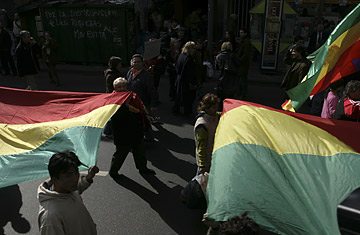
Demonstrators carry flags during a march in support of Bolivia's President Evo Morales.
Despite the frantic efforts of Latin American diplomats to broker a truce, many Bolivians see the political violence that has shaken their country over the past week as the opening salvos of a civil war. "There isn't a bone in her body that's not broken," says Narda Baqueros, a mother of three who traveled 15 hours to the town of Cobija to retrieve the body of her niece Belki Paz Baqueros on Monday. In her mid-20s and three months pregnant, Belki was beaten to death early Friday morning by opponents of Bolivia's leftist President Evo Morales. "Everyone is armed and everyone is saying this is war," Baqueros says. "I saw patches of blood-stained grass everywhere, like there have been massacres."
At least 30 supporters of President Morales, and possibly a lot more, have been killed over the past week as an opposition campaign to obtain autonomy for the resource-rich eastern regions they control turned violent. The opposition Prefects are demanding greater control over policies ranging from land reform to the allocation of the earnings of Bolivia's natural gas exports, which originate in their regions. Earlier this year, the departments of Tarija, Santa Cruz, Pando and Beni voted overwhelmingly in favor of opposition-drafted autonomy statutes, but since those referenda were not sanctioned by the national electoral court, the central government refuses to recognize the results.
The confrontations escalated a few weeks ago when President Morales, having won last month's election with a resounding 67% majority, scheduled a vote on a new constitution drafted by his government. The opposition cried foul, demanding that the new constitution incorporate the autonomy statutes, and their supporters in the outlying regions began violently seizing control over state buildings. For weeks, TV images showed outnumbered policemen cowering from armed mobs of opposition supporters ransacking government buildings and randomly attacking indigenous people. (Morales is Bolivia's first indigenous president, and the indigenous people remain his strongest support base.)
With the police apparently unable to maintain order, in some parts of the country government supporters began to organize themselves to defend the government, sparking increasingly bitter confrontations. It took until last Friday for Morales to declare martial law and send troops into the regional department of Pando. There, on Tuesday, they arrested Leopoldo Fernandez, the Prefect of the Pando department, accusing the opposition leader of spearheading violence.
The event that may have triggered the declaration of martial law in Pando was last Thursday's attack on unarmed government supporters marching near the town of Porvenir. "They ambushed us as we neared Porvenir," says one survivor, who preferred to remain anonymous. At least 14 Morales supporters were killed in the incident, and dozens more were injured. "They came out of nowhere and started shooting with rifles. They didn't even care that there were women and children with us."
The massacre of his supporters appears to have galvanized Morales. He learned his own politics on the streets, leading protests by his fellow coca growers, and he may have been hesitant to use force in light of Bolivia's recent history: In October 2003, 67 people were killed and more than 400 wounded when then-President Gonzalo "Goni" Sanchez de Lozada sent the military out against demonstrators disrupting road traffic to protest against a plan to export natural gas to Chile. The violence forced Goni to resign and flee to the U.S., where he remains. Morales has far more political support than Goni, but the memory of military massacre still haunts Bolivian politics. Still, the pressure from his own support base may have prompted Morales to intervene in the wake of Porvenir. The sentiments expressed by Baqueros are typical: "People don't even fear the police anymore," she says. "The government has got to get tougher. Either they put an end to this madness or we will do it ourselves."
Fernandez, who was accused in 2006 of training paramilitaries — an accusation he denies — was arrested Tuesday after witnesses claimed that the gunmen at Porvenir were regional government officials under the Prefect's command. Fernandez has not commented on claims he was involved. While the arrest is likely to please Morales' base, it may cloud prospects for stabilizing the situation through dialogue. Opposition leaders Tuesday Opposition leaders demanded the release of Fernandez and all "political prisoniers" apprehended on charges relating to last week's violence. While the opposition leaders left the door open for dialogue, the incarceration of Fernandez doesn't bode well for negotiations.
Morales may get help brokering a solution from abroad. Although he kicked out U.S. Ambassador Philip Goldberg last week, accusing him of fomenting conflict, the Union of South American Nations (UNASUR) has rallied to his support. At an emergency meeting on Sunday to discuss the crisis, the presidents of nine Latin American countries gave Morales their full support, and offered to send a team to mediate. "The fundamental, legitimate basis of Bolivian democracy is the government of President Evo Morales and the territorial integrity of the country and that should not be questioned at any moment," read the declaration from Bolivia's neighbors. The UNASUR statement echoes the views of Brazil's President Lula da Silva, whose support for Morales is crucial since the opposition-controlled regions abut his country.
While moves towards dialogue and compromise on the sharing of energy-export revenues between the central government and the regions may be in the works, the wounds opened by the latest upsurge in violence will not easily be healed. On the question of the autonomy demanded by the regions, thus far no middle ground appears to have opened up. And neither side appears willing to back down.
